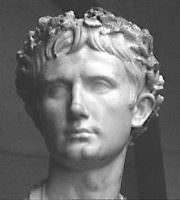About Horace
Horace was the leading Roman lyric poet during the time of Augustus (also known as Octavian). He is regarded as the world's first autobiographer – In his writings, he tells us far more about himself, his character, his development, and his way of life than any other great poet in antiquity. Some of the biographical writings contained in his writings can be supplemented from the short but valuable Life of Horace by Suetonius (in his Lives of the Poets). The rhetorician Quintilian regarded his Odes as just about the only Latin lyrics worth reading: 'He can be lofty sometimes, yet he is also full of charm and grace, versatile in his figures, and felicitously daring in his choice of words'. The Epistles may be considered among Horace's most innovative works. There was nothing like it in Greek or Roman literature. Occasionally poems had had some resemblance to letters, including an elegiac poem from Solon to Mimnermus and some lyrical poems from Pindar to Hieron of Syracuse. Horace developed a number of inter-related themes throughout his poetic career, including politics, love, philosophy and ethics, his own social role, as well as poetry itself. His Epodes and Satires are forms of 'blame poetry' and both have a natural affinity with the moralising and diatribes of Cynicism. This often takes the form of allusions to the work and philosophy of Bion of Borysthenes but it is as much a literary game as a philosophical alignment. By the time he composed his Epistles, he was a critic of Cynicism along with all impractical and high-falutin philosophy in general.Browse all poems and texts published on Horace









